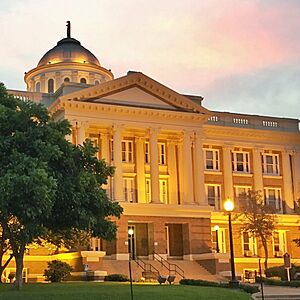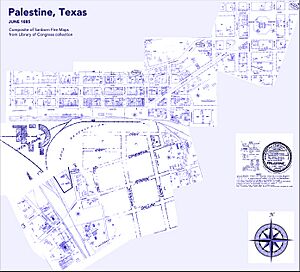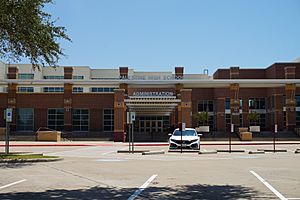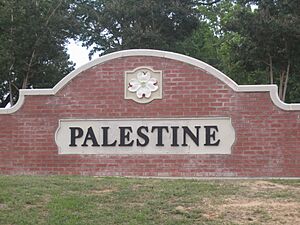Palestine, Texas facts for kids
Quick facts for kids
Palestine, Texas
|
|
|---|---|
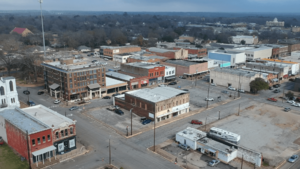
Downtown Palestine
|
|
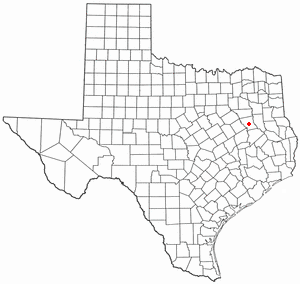
Location of Palestine, Texas
|
|
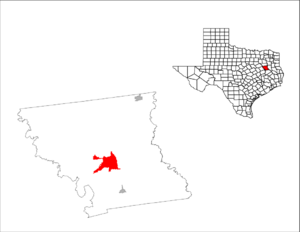 |
|
| Country | |
| State | |
| County | Anderson |
| Government | |
| • Type | Council–manager |
| Area | |
| • Total | 19.63 sq mi (50.83 km2) |
| • Land | 19.42 sq mi (50.30 km2) |
| • Water | 0.20 sq mi (0.53 km2) |
| Elevation | 509 ft (155 m) |
| Population
(2020)
|
|
| • Total | 18,544 |
| • Density | 912.88/sq mi (352.46/km2) |
| Time zone | UTC-6 (Central (CST)) |
| • Summer (DST) | UTC-5 (CDT) |
| ZIP codes |
75801-75803, 75882
|
| Area code(s) | 903, 430 |
| FIPS code | 48-54708 |
| GNIS feature ID | 2411355 |
Palestine (/ˈpælɪstiːn/ pal-IST-een) is a city in Texas, USA. It is the main city and county seat of Anderson County. The city was named after Palestine, Illinois, by a preacher named Daniel Parker. Another person, Micham Main, also helped name it after his hometown, also Palestine, Illinois.
In 2020, about 18,544 people lived in Palestine. This makes it the sixth-largest city in Northeast Texas. Palestine is a smaller city located in the Piney Woods area. It is about the same distance from big cities like Dallas, Houston, and Shreveport, Louisiana.
Palestine is known for its beautiful nature. It has a special season when dogwood trees bloom. The city also has 23 historic places listed on the National Register of Historic Places. It was once the end point of the old Texas State Railroad. Today, this railroad is a museum where you can ride old steam and diesel trains. These trains travel between Palestine and Rusk.
Contents
History of Palestine
How Palestine Started
In 1846, the Texas government created Palestine. It was made to be the main city for the new Anderson County. Three men, James R. Fulton, Johnston Shelton, and William Bigelow, helped plan the town. They designed it with a central courthouse square and 24 blocks around it. Before the town was officially created, there was a trading post here since at least 1843. The town grew a lot when the railroad arrived in the 1870s. By 1898, more than 10,000 people lived there.
Micham Main named Palestine, Texas, to honor his hometown of Palestine, Illinois.
The Railroad's Role
The Texas State Railroad is now a state park. Visitors can ride trains pulled by diesel and steam locomotives. These trains travel between old Victorian-style depots and through the forests of East Texas. The railroad started in 1883. It was built to carry raw materials for an iron smelter at the Rusk Penitentiary. Prisoners helped build the railroad. By 1909, the line reached Palestine. Regular train service stopped in 1921. The Texas government made the railroad a state park in 1972.
Two other railroads, the International Railroad and the Houston and Great Northern Railroad, met in Palestine in 1872. They joined in 1873 to form the International and Great Northern Railroad (IGN). This railroad later became part of the Union Pacific Railroad. In 1875, the IGN president moved to Palestine. He built the first Victorian mansion there. Other wealthy people and railroad leaders built fancy homes on South Sycamore Street. The IGN built a big train station in 1892. They also built a modern passenger coach shop in 1902. This made Palestine an important place for trains. Today, the Palestine Car Shop is one of only two places on the Union Pacific Railroad that does major repairs on freight cars. More than 100 people work there.
Palestine in the 1900s
In 1914, the county's fifth courthouse was finished. It is still used today. Oil was found near Palestine in 1928. This helped the town's economy grow and become more diverse. Palestine became a center for oil-well services and supplies.
The Blackburn Crossing Dam was built starting in 1960. It created Lake Palestine to provide a steady source of water. The dam was finished in 1962. It was made bigger between 1969 and 1972. It became 75 feet high and 5,720 feet long.
Geography and Nature
Palestine is located in the middle of Anderson County. It is at 31°45′29″N 95°38′19″W / 31.75806°N 95.63861°W. Many highways meet in the city. These include U.S. Highways 79, 84, and 287. Also, Texas State Highways 19 and 155 pass through. Dallas is about 110 miles to the northwest. Houston is about 150 miles to the south. Tyler is about 47 miles to the northeast.
The city covers about 19.6 square miles (50.7 square kilometers). Most of this is land, with a small part being water.
Nearby Towns
 |
Corsicana (58 miles) |
Athens (34 miles) |
Tyler (47 miles) Jacksonville (26 miles) |
 |
| Fairfield (36 miles) |
Rusk (30 miles) |
|||
| College Station (103 miles) |
Elkhart (10 miles) Crockett (35 miles) |
Nacogdoches (65 miles) |
| Weather chart for Palestine, Texas | |||||||||||||||||||||||||||||||||||||||||||||||
|---|---|---|---|---|---|---|---|---|---|---|---|---|---|---|---|---|---|---|---|---|---|---|---|---|---|---|---|---|---|---|---|---|---|---|---|---|---|---|---|---|---|---|---|---|---|---|---|
| J | F | M | A | M | J | J | A | S | O | N | D | ||||||||||||||||||||||||||||||||||||
|
3.6
58
37
|
3.3
64
41
|
3.9
71
48
|
3.8
78
55
|
4.5
84
63
|
4.5
90
69
|
2.6
94
72
|
3.2
94
71
|
3.5
89
66
|
4.9
80
55
|
4.4
68
47
|
4.2
60
39
|
||||||||||||||||||||||||||||||||||||
| temperatures in °F precipitation totals in inches source: Weather.com / NWS |
|||||||||||||||||||||||||||||||||||||||||||||||
|
Metric conversion
|
|||||||||||||||||||||||||||||||||||||||||||||||
Lake Palestine's Beauty
Lake Palestine is a freshwater lake. It was made when the Blackburn Crossing dam was built on the Neches River in 1962. The lake is 25,600 acres big. It is 18 miles long and has 135 miles of shoreline. The average depth is about 16 feet. It is a great place for fishing. You can find fish like bass, crappie, and catfish there.
The Upper Neches River Municipal Water Authority manages Lake Palestine. The City of Palestine has a contract to get 25 million gallons of water from the lake each day. This water travels through a channel and 13 miles of pipeline to a water treatment plant. The city operates this plant to clean the water for its residents.
Roads and Highways
Palestine is a central point where several important highways meet:
 U.S. Highway 79 goes from Austin in the southwest. It continues northeast to Shreveport and other states.
U.S. Highway 79 goes from Austin in the southwest. It continues northeast to Shreveport and other states. U.S. Highway 84 comes from Waco in the west. It goes east into Louisiana and other states.
U.S. Highway 84 comes from Waco in the west. It goes east into Louisiana and other states. U.S. Highway 287 travels from Fort Worth in the northwest. It continues southeast to Beaumont and Port Arthur.
U.S. Highway 287 travels from Fort Worth in the northwest. It continues southeast to Beaumont and Port Arthur. State Highway 19 goes from Huntsville in the south. It continues north to Athens and Paris.
State Highway 19 goes from Huntsville in the south. It continues north to Athens and Paris. State Highway 155 starts in Palestine and goes northeast to Tyler.
State Highway 155 starts in Palestine and goes northeast to Tyler. Loop 127 is a road that stays completely within Palestine.
Loop 127 is a road that stays completely within Palestine. Loop 256 goes around downtown Palestine.
Loop 256 goes around downtown Palestine.
Palestine's Climate
- The warmest month in Palestine is usually July.
- The hottest temperature ever recorded was 114 degrees Fahrenheit in 1954.
- The coolest month on average is January.
- The coldest temperature ever recorded was -4 degrees Fahrenheit in 1930.
- The most rain usually falls in October.
People of Palestine
| Historical population | |||
|---|---|---|---|
| Census | Pop. | %± | |
| 1850 | 2,000 | — | |
| 1860 | 1,938 | −3.1% | |
| 1870 | 2,311 | 19.2% | |
| 1880 | 2,997 | 29.7% | |
| 1890 | 5,838 | 94.8% | |
| 1900 | 8,297 | 42.1% | |
| 1910 | 10,482 | 26.3% | |
| 1920 | 11,039 | 5.3% | |
| 1930 | 11,445 | 3.7% | |
| 1940 | 12,144 | 6.1% | |
| 1950 | 12,503 | 3.0% | |
| 1960 | 13,974 | 11.8% | |
| 1970 | 14,525 | 3.9% | |
| 1980 | 15,948 | 9.8% | |
| 1990 | 18,042 | 13.1% | |
| 2000 | 17,598 | −2.5% | |
| 2010 | 18,712 | 6.3% | |
| 2020 | 18,544 | −0.9% | |
| U.S. Decennial Census | |||
In 1850, Palestine had about 2,000 people. Ten years later, the population dropped a little. But since then, it has grown. In 2010, the population reached its highest at 18,712. By 2020, there were 18,544 people living in the city.
| Race | Number | Percentage |
|---|---|---|
| White (NH) | 8,450 | 45.56% |
| Black or African American (NH) | 4,439 | 23.93% |
| Native American or Alaska Native (NH) | 69 | 0.37% |
| Asian (NH) | 166 | 0.9% |
| Pacific Islander (NH) | 6 | 0.03% |
| Some Other Race (NH) | 56 | 0.3% |
| Mixed/Multi-Racial (NH) | 598 | 3.22% |
| Hispanic or Latino | 4,760 | 25.67% |
| Total | 18,544 |
The city's population has grown over time. Most people in Palestine are non-Hispanic white or Black or African American. In 2020, about 45.56% of people were non-Hispanic white. About 23.93% were Black or African American. Hispanic or Latino Americans made up about 25.67% of the population. People from two or more races were about 3.22%.
In 2020, there were about 6,560 households in Palestine. The average household had 2.68 people. About 57.9% of homes were owned by the people living in them. The rest were rented. In 2000, the average income for a household was about $30,497 per year. By 2020, this had increased to about $40,684 per year.
Economy and Jobs
Like many smaller towns in America, Palestine's economy relies on small businesses. It also has local branches of bigger national and international stores. The largest employer in Palestine is the Texas Department of Criminal Justice. This organization employs over 3,900 people. Palestine also has a strong medical and healthcare industry. This sector serves the many retired people living in the area.
Education in Palestine
Public Schools
The Palestine Independent School District is the largest school district in the city. It has almost 3,500 students. The district includes:
- Palestine High School for grades 9–12.
- Palestine Junior High for grades 7–8.
- A. M. Story Elementary for grades 4–6.
- Southside Primary for grades 2–3.
- Northside Early Childhood Center for Pre-Kindergarten to 1st grade.
The Westwood Independent School District is on the west side of Palestine. It has about 1,700 students. This district includes:
- Westwood High School for grades 9–12.
- Westwood Junior High for grades 7–8.
- Westwood Elementary for grades 3–6.
- Westwood Primary for grades K–2.
A small part of the city is also in the Elkhart ISD.
Charter Schools
University Academy is a special charter school. It is run by the University of Texas at Tyler. It started in 2012 with grades 3–6. It has been adding one grade level each year. In 2018, the school had 188 students. It plans to grow to 600 students. The university announced plans to improve the school building in 2018.
Colleges and Universities
Trinity Valley Community College has a campus in Palestine. It is just north of the city. This campus offers classes that can transfer to a four-year college. It also has job training programs. These include nursing, cosmetology, computer science, and criminal justice. They also train correctional officers for the Texas Department of Criminal Justice.
The University of Texas at Tyler also has a campus in Palestine. A new campus opened in 2010. It cost $9.6 million and covers 50 acres. The UT-Tyler Palestine Campus currently offers courses in nursing.
Media and News
Palestine has a daily newspaper called the Palestine Herald-Press. It started in 1849 as the Palestine Advocate. It is now owned by Community Newspaper Holdings.
Television for Palestine comes from the Tyler broadcast market. The closest TV station is KETK-TV (NBC). Most radio stations serving Palestine also come from Tyler, Jacksonville, or Henderson.
Internet service in the city is mainly provided by Suddenlink and CenturyLink. Windstream serves the more rural areas.
Getting Around Palestine
Palestine is a hub for several major highways:
 U.S. Highway 79 connects Palestine to Austin in the southwest. It continues northeast to states like Louisiana and Arkansas.
U.S. Highway 79 connects Palestine to Austin in the southwest. It continues northeast to states like Louisiana and Arkansas. U.S. Highway 84 comes from Colorado and Waco in the west. It goes east to Louisiana and other states.
U.S. Highway 84 comes from Colorado and Waco in the west. It goes east to Louisiana and other states. U.S. Highway 287 goes from Beaumont in the southeast. It continues northwest to Fort Worth and states like Oklahoma and Colorado.
U.S. Highway 287 goes from Beaumont in the southeast. It continues northwest to Fort Worth and states like Oklahoma and Colorado. State Highway 19 travels from Huntsville in the south. It continues north to Athens and Paris.
State Highway 19 travels from Huntsville in the south. It continues north to Athens and Paris. State Highway 155 starts in Palestine and goes northeast to Tyler.
State Highway 155 starts in Palestine and goes northeast to Tyler. Loop 127 is a road that is entirely within Palestine.
Loop 127 is a road that is entirely within Palestine. Loop 256 circles around downtown Palestine.
Loop 256 circles around downtown Palestine.
Palestine Airport
Palestine has a small airport called Palestine Municipal Airport. It is on the northwest side of the city. It opened in 1942. Its main runway is about 5,000 feet long. The airport is home to 31 airplanes. The city owns and operates it. In the 1940s and 1950s, an airline called Trans-Texas Airlines used to fly to Palestine. They used Douglas DC-3 planes. This service stopped between 1952 and 1954.
Famous People from Palestine
- Aaron Aryanpur (born 1977), a stand-up comedian.
- Blacktop Mojo, a rock band.
- Smith Ballew (1902–1984), an actor, singer, and orchestra leader.
- Steven L. Bennett (1946–1972), a United States Air Force pilot who received the Medal of Honor.
- Elton Bomer (born 1935), a politician who served in the Texas government.
- Bill Bradley (born 1947), a former American football coach.
- Guy Brown (born 1955), a former NFL linebacker for the Dallas Cowboys.
- Ivory Lee Brown (born 1969), a former NFL running back for the Arizona Cardinals.
- Thomas M. Campbell (1856–1923), the 24th Governor of Texas.
- Russ Cotton (1915–2009), an NFL quarterback for the Pittsburgh Steelers.
- Keith Crawford (born 1970), a former NFL cornerback for the Green Bay Packers.
- Oscar Dugey (1887–1966), an MLB second baseman for the 1915 Philadelphia Phillies.
- Dick H. Guinn (1918–1980), a United States Navy Vice Admiral.
- Ben Howard (1904–1970), an aviator and engineer.
- Whiskey Myers, a Southern rock/country band.
- Jack Pepper (1902–1979), a dancer, singer, comedian, and musician.
- Adrian Peterson (born 1985), an NFL running back, known for the Minnesota Vikings. He was the 2012 MVP.
- John H. Reagan (1818–1905), a US Congressman and Senator.
- James Saxton (1940–2014), an All-American NFL halfback for the Dallas Texans.
- Tye Sheridan (born 1996), an American actor and producer.
- Todd Staples (born 1963), Texas Commissioner of Agriculture and former state legislator.
- Gene Watson (born 1943), a country music singer.
- Alliene Brandon Webb (1910–1965), a composer, singer, and teacher.
See also
 In Spanish: Palestine (Texas) para niños
In Spanish: Palestine (Texas) para niños
 | James Van Der Zee |
 | Alma Thomas |
 | Ellis Wilson |
 | Margaret Taylor-Burroughs |


